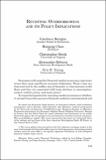Artículo
Revisiting overborrowing and its policy implications
Fecha
2011Resumen
Economies with imperfect financial market access may experience crises that cause significant economic dislocation. These crises are characterized by the sudden stop of domestic or international credit flows and they are associated with large declines in consumption output relative prices and asset prices. An important question for emerging-market economies is whether in normal times when access to financial markets is unconstrained and plentiful excessive borrowing affects the likelihood and the severity of these crises. This question is important because the policy implications of alternative answers are very different. If there is excessive or inefficient borrowing in good times (that is 'overborrowing') policy should be geared primarily toward addressing the ex ante inefficiency that causes it for example by imposing a tax on capital flows or other forms of capital controls and prudential regulations to reduce the incentives to borrow excessively.
Colecciones
Descargar


